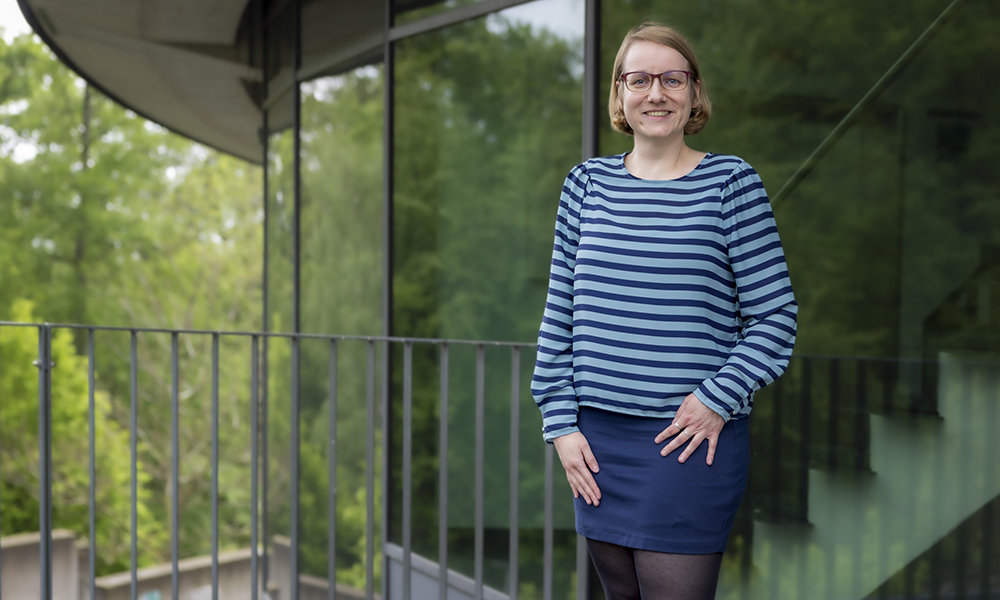
We are EMBL: Sabrina Krueger on being a skill development guide
The scientist-turned-training officer shares her approach to this role and the need to be ‘true to yourself’

Sabrina Krueger may have started out intending to do research, but today EMBL is benefiting from her choice to transition to training other scientists. Here’s an opportunity to learn how she transformed her own experiences and career questions to be part of a powerful team that designs and executes predoc and postdoc training.
Tell me about your role at EMBL as a scientific training officer.
As the Scientific Training Officer, I work closely with my colleagues to deliver EMBL’s Complementary Scientific Skills Programme, which was established in 2019 by our Internal Scientific Training Team to further strengthen the existing support for fellows in the EMBL International PhD Programme and EMBL Postdoctoral Programme. I am excited to grow and refine our course portfolio by identifying additional courses and designing them. I really like how I get to be creative and innovative in developing training that benefits our fellows. Additionally, I get to deliver some training myself. Getting to know EMBL’s predocs and postdocs helps me understand their needs and challenges to design targeted training that supports them at EMBL. Together with the EMBL Fellows’ Career Service, the Complementary Scientific Skills Programme also prepares fellows for their careers beyond EMBL, no matter what career path they may ultimately travel.
What training opportunities in EICAT are you most excited about?
We are increasingly aware of how important it is to have well-rounded skill sets in science. You can’t just be an expert in one field of research, you must also communicate effectively with others in different team settings, demonstrate cultural empathy, be an inspiring leader, and much more. It’s why we offer targeted complementary scientific skills training for pre- and postdoctoral fellows located at all six EMBL sites. Over the next few years, we aim to take advantage of in-house resources to tailor individual courses further. We already work with EMBL’s Creative Team to offer courses on creating compelling posters, graphical abstracts, and slides for presentations. However, we want to expand our course portfolio. Currently, I am developing a new, very practical course aimed at predoctoral fellows early in their academic journey to help them manage their research projects. We hope to pilot this course later this year.
How did you transition from traditional laboratory scientist to trainer?
I have always been passionate about and involved in training and mentoring other scientists even when it wasn’t part of my official job description. My professional career began as a biological laboratory assistant in industry where I thoroughly enjoyed working at the bench. However, I also realised early on I felt very rewarded working with and training less experienced scientists. Even during my studies and pre- and postdoctoral research, I was eager to mentor, teach, train, and inspire others – from high-school students to fellow postdocs. Ultimately, during my postdoc, I decided to shift entirely to training. After almost 20 years in various lab settings in Germany and the US, I decided it was time to change my career trajectory. I wanted to remain connected to the scientific community and academia and continue working with PhD students and postdocs. My position as Scientific Training Officer allows that. Moreover, having gone through the experience myself, I understand the associated challenges, and the diversity of skills required for success in a scientific career.
What propelled you toward science as a career choice? Do you recall your first brush with science that sparked your interest?
I always really liked natural sciences and maths – even early on in school. So, when I needed to select advanced courses in secondary school, I decided on biology and chemistry.
What are some of your favourite things to do in Heidelberg on a Sunday afternoon?
I am still in the process of getting to know Heidelberg and its surrounding areas. So far, I am continuously appreciating the proximity of my apartment to nature. I can just step out into the fields and enjoy the sun. I greatly enjoy hiking and just being outside.
If you could have kaffee und kuchen with three famous people, who would you invite?
This question isn’t as easy as it seems! Jason Buenrostro (Harvard University researcher who developed the ATAC-seq and single-cell ATAC-seq methods) is one of my science heroes. Additionally, I’d like to invite Allison Janney who portrays my favourite character in one of my favourite TV shows (the role of White House press secretary C.J. Cregg on the West Wing), and finally, Travis Kelce, a tight-end for the Kansas City Chiefs.
What is the best advice you’ve gotten that still guides you today?
“Stay true to yourself!” It’s about always prioritising your own values and beliefs, even in challenging situations. We make numerous decisions daily – probably most of them are inconsequential, while others are life-changing. And decisions about one’s professional future and career path are particularly daunting. “Stay true to yourself!” has helped me make decisions that align with my principles, even when it may be difficult or unpopular. In the end, I know myself best.


